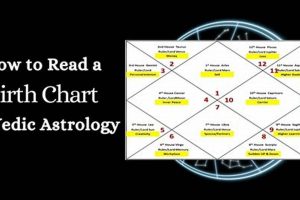In Vedic astrology, the position of the Sun in a particular zodiac sign at the time of an individual’s birth determines their solar sign. This placement reveals core personality traits, ego, self-expression, and overall life purpose. For instance, someone born when the Sun is transiting Leo is considered to have a Leo solar sign.
This celestial placement is considered foundational within Vedic astrology, providing insights into an individual’s strengths, weaknesses, and karmic predispositions. Understanding this placement is believed to offer self-awareness, guiding individuals toward fulfilling their potential and navigating life’s challenges more effectively. Historically, this knowledge has been utilized for personal growth and understanding one’s role in the larger cosmic tapestry.
Further exploration of this astrological concept will delve into the specific characteristics associated with each solar sign, the nuances of planetary influences, and the significance of these placements in interpersonal relationships and broader life contexts.
Tips for Understanding Solar Placements in Vedic Astrology
These tips offer guidance on incorporating the understanding of solar placements into a deeper exploration of Vedic astrology.
Tip 1: Consider the Nakshatra: Beyond the solar sign, examine the specific lunar mansion (Nakshatra) the Sun occupied at birth for a more nuanced perspective on individual characteristics.
Tip 2: Analyze Planetary Aspects: Investigate the influences of other planets on the Sun’s placement to understand how its energy is modified and expressed.
Tip 3: Study the Divisional Charts: Explore the various divisional charts (Vargas) to gain insights into specific areas of life influenced by the solar placement, such as career or relationships.
Tip 4: Consult with a Qualified Astrologer: For a comprehensive and personalized interpretation of the solar sign’s influence, seek guidance from an experienced Vedic astrologer.
Tip 5: Integrate Self-Reflection: Combine astrological insights with self-observation and introspection to gain a more profound understanding of one’s inherent nature.
Tip 6: Focus on Personal Growth: Utilize the knowledge of solar placements to identify strengths and weaknesses, facilitating personal development and self-improvement.
By understanding and applying these tips, individuals can gain a deeper understanding of the significance of solar placements within Vedic astrology, empowering them to navigate life with greater awareness and purpose. This knowledge facilitates a deeper exploration of Vedic astrology as a whole.
These insights offer a foundation for further exploration of the complexities and interconnectedness within Vedic astrological principles.
1. Core Identity
Within Vedic astrology, the solar sign serves as a blueprint for an individual’s core identity. This placement reveals fundamental characteristics that influence temperament, motivations, and overall life path. Understanding the solar sign provides valuable insights into the inherent nature of the self.
- Sense of Self:
The solar sign illuminates one’s fundamental sense of self. It represents the ego, the “I” at the core of one’s being. For example, an Aries solar sign often signifies a strong, independent sense of self, while a Pisces solar sign may suggest a more fluid and adaptable identity. This facet influences how individuals perceive themselves and interact with the world.
- Motivations & Desires:
Solar placements shed light on inherent motivations and desires. A Taurus solar sign often seeks stability and material comfort, while a Sagittarius solar sign may be driven by a thirst for knowledge and exploration. Understanding these inherent drives provides insights into what fuels an individual’s actions and aspirations.
- Expression of Self:
The solar sign governs how one expresses themselves outwardly. A Gemini solar sign may express themselves through communication and intellectual pursuits, while a Scorpio solar sign might express themselves through intense emotional depth. This facet influences how individuals project themselves and interact with their surroundings.
- Karmic Predispositions:
The solar sign also offers insights into karmic predispositions. It suggests certain life lessons and challenges an individual might encounter. These experiences contribute to the evolution of the core identity throughout life, shaping and refining one’s sense of self.
These facets of core identity, as revealed by the solar sign, intertwine to shape the individual’s unique personality and life path. This foundational understanding provides a framework for navigating life’s experiences and understanding one’s place within the larger cosmic order. It offers a lens through which to interpret the nuances of individual characteristics and motivations.
2. Life Purpose
Vedic astrology posits a strong correlation between the solar sign and an individual’s inherent life purpose or dharma. This placement is believed to illuminate the individual’s unique contribution to the world and the path best suited for fulfilling their potential. The solar sign acts as a compass, guiding one towards a life of meaning and alignment with their true nature. For example, a Virgo solar sign often suggests a life purpose centered around service and meticulous attention to detail, potentially manifesting in careers related to healthcare, research, or organization. Conversely, an Aquarius solar sign might indicate a life purpose focused on innovation, social reform, or humanitarian endeavors.
Understanding this connection provides valuable insights into one’s inherent strengths and talents. It can clarify career choices, guide relationships, and illuminate the underlying motivations driving one’s actions. This knowledge empowers individuals to pursue paths aligned with their intrinsic nature, leading to greater fulfillment and a sense of purpose. However, it is important to acknowledge that life purpose is not solely determined by the solar sign; other planetary placements and karmic influences also play significant roles. Analyzing the entire birth chart provides a more comprehensive understanding of an individual’s unique dharma.
Integrating the understanding of life purpose, as indicated by the solar sign, allows for a deeper engagement with Vedic astrological principles. This knowledge offers a framework for self-discovery and empowers individuals to align their actions with their inherent potential. Recognizing the potential challenges and complexities involved in interpreting astrological placements underscores the importance of combining astrological insights with self-reflection and critical thinking. This multifaceted approach allows individuals to navigate life with greater awareness and purpose, ultimately fostering a more meaningful and fulfilling existence.
3. Karmic Influences
Within Vedic astrology, the solar sign is believed to reflect karmic influences accumulated from past lives. This placement indicates specific karmic lessons, challenges, and opportunities for growth in the current lifetime. Understanding these influences provides a deeper perspective on one’s inherent nature and the path towards self-realization. It illuminates the interplay between past actions and present experiences.
- Prarabdha Karma:
The solar sign is thought to signify the portion of prarabdha karma, or the karma destined to unfold in the present life. This manifests as inherent predispositions, strengths, and weaknesses. For example, an individual born with a Saturn-influenced solar sign might experience limitations or delays in certain areas of life, representing karmic debts to be resolved. These experiences, while potentially challenging, offer opportunities for growth and liberation from karmic patterns.
- Samskaras:
The solar sign also reflects deep-rooted impressions or samskaras carried over from past lives. These subconscious patterns influence thoughts, emotions, and behaviors. For example, an individual with a Venus-influenced solar sign might possess a natural inclination towards artistic pursuits or harmonious relationships, reflecting positive samskaras cultivated in past lives. These inherent tendencies shape one’s experience of the world and influence the choices made in the present.
- Life Lessons:
The solar sign can indicate specific karmic lessons an individual is meant to learn in this lifetime. A Mars-influenced solar sign, for instance, might suggest a need to cultivate patience and control over impulsive tendencies. These life lessons, often presented through challenges and obstacles, provide opportunities for personal growth and spiritual evolution. Navigating these challenges consciously facilitates karmic resolution and progress towards self-mastery.
- Evolutionary Path:
The solar sign, viewed through a karmic lens, points towards an individual’s evolutionary path. It suggests the direction of growth and the potential for spiritual unfolding. For example, a Jupiter-influenced solar sign might indicate a propensity for philosophical inquiry and spiritual seeking. By understanding these inherent inclinations, individuals can consciously choose paths that support their karmic evolution and lead to greater self-awareness and spiritual fulfillment.
By exploring the interplay of these karmic influences within the context of the solar sign, Vedic astrology offers a framework for understanding the deeper meaning and purpose of one’s life experiences. This understanding empowers individuals to navigate challenges with greater awareness and to consciously work towards karmic resolution and spiritual growth. The solar sign, therefore, becomes not merely an indicator of personality traits, but a key to unlocking one’s karmic potential and fulfilling one’s dharma.
4. Strengths & Weaknesses
Vedic astrology associates inherent strengths and weaknesses with each solar sign. These attributes are not viewed as absolute positive or negative qualities, but rather as inherent tendencies that can manifest constructively or destructively depending on individual development and karmic influences. Understanding these tendencies offers opportunities for self-improvement and navigating life challenges more effectively. For instance, the fiery nature of an Aries solar sign can manifest as dynamic leadership and courage, representing a key strength. However, this same energy can also lead to impulsiveness and impatience, potentially becoming a weakness if not consciously managed. Similarly, the grounded nature of a Taurus solar sign can manifest as practicality and reliability, valuable strengths, but may also lead to resistance to change or stubbornness, representing potential weaknesses. Analyzing these inherent tendencies provides a framework for understanding individual behavior and motivations.
Recognizing and accepting both strengths and weaknesses associated with one’s solar sign is crucial for personal growth. This understanding allows individuals to leverage their natural talents effectively while mitigating potential negative tendencies. For example, an individual aware of their tendency towards impulsiveness (a potential weakness associated with Aries) can cultivate mindfulness and strategic planning to channel their energy more constructively. Conversely, someone aware of their potential for stubbornness (a potential weakness associated with Taurus) can cultivate flexibility and openness to new perspectives, fostering adaptability. This conscious engagement with inherent strengths and weaknesses empowers individuals to navigate life’s complexities with greater awareness and effectiveness.
Integrating this understanding of strengths and weaknesses within the broader context of Vedic astrology provides valuable insights into individual potential and karmic predispositions. This knowledge facilitates self-awareness, enabling individuals to make conscious choices that align with their inherent nature and support their evolutionary path. While the solar sign offers a foundational understanding of these tendencies, analyzing the entire birth chart provides a more nuanced and comprehensive perspective on individual strengths and weaknesses, facilitating a deeper understanding of oneself and one’s place within the larger cosmic tapestry.
5. Self-Expression
Vedic astrology posits a strong connection between the solar sign and an individual’s mode of self-expression. This celestial placement illuminates how one projects their inner self into the outer world, influencing communication styles, creative pursuits, and overall demeanor. Understanding this connection provides valuable insights into individual behavior and interpersonal dynamics. It offers a framework for interpreting how one’s inherent nature manifests in their interactions with the world.
- Communication Style:
The solar sign influences how one communicates and interacts with others. For example, a Gemini solar sign often suggests a communicative and intellectually-oriented style, while a Cancer solar sign may indicate a more emotionally nuanced and intuitive approach to communication. These inherent tendencies shape how individuals express their thoughts and feelings, influencing interpersonal dynamics and relationships. Recognizing these patterns allows for more effective communication and understanding in diverse social contexts.
- Creative Expression:
Solar placements also influence creative inclinations and artistic pursuits. A Leo solar sign often suggests a flair for dramatic expression and performance, while a Virgo solar sign may indicate a preference for detailed and intricate creative endeavors. These inherent tendencies shape how individuals channel their creative energies, influencing artistic choices and preferred modes of expression. Understanding these inclinations can guide individuals towards fulfilling creative pursuits and artistic endeavors that align with their inherent nature.
- Outer Demeanor:
The solar sign contributes to one’s overall demeanor and how they present themselves to the world. A Libra solar sign often projects an aura of diplomacy and charm, while a Scorpio solar sign may exude an air of intensity and mystery. These inherent tendencies influence how individuals are perceived by others and shape their social interactions. Recognizing these patterns allows for greater self-awareness and understanding of how one’s outer presentation impacts interpersonal dynamics.
- Emotional Expression:
The solar sign also influences how emotions are expressed outwardly. An Aries solar sign often suggests a direct and spontaneous expression of emotions, while a Pisces solar sign may indicate a more sensitive and empathetic approach to emotional expression. These inherent tendencies shape how individuals process and communicate their feelings, influencing interpersonal relationships and emotional well-being. Understanding these patterns allows for greater emotional intelligence and more effective management of emotional responses in various life situations.
These facets of self-expression, as revealed by the solar sign, intertwine to create a unique and dynamic individual presentation. Understanding these influences within the context of Vedic astrology provides valuable insights into one’s inherent nature and how it manifests in the world. This knowledge fosters self-awareness, enhances communication skills, and supports the development of authentic self-expression. It deepens the understanding of how the solar sign shapes individual interactions and contributions within the broader social landscape.
Frequently Asked Questions about the Solar Sign in Vedic Astrology
This section addresses common inquiries regarding the significance and interpretation of solar placements within Vedic astrology.
Question 1: How does the Vedic solar sign differ from the Western zodiac sign?
Vedic astrology uses a sidereal zodiac based on the fixed positions of constellations, while the Western zodiac employs a tropical system based on the Sun’s apparent position relative to the Earth. This difference can result in variations of approximately 24 degrees, leading to different sign designations in some cases.
Question 2: Does the solar sign alone determine one’s entire personality?
While the solar sign provides significant insights into core personality traits, it’s essential to consider the entire birth chart, including planetary placements, aspects, and divisional charts, for a comprehensive astrological analysis.
Question 3: Can the solar sign predict future events?
Vedic astrology focuses on understanding inherent predispositions and karmic influences rather than predicting specific events. It provides insights into potential challenges and opportunities for growth, empowering individuals to navigate life with greater awareness.
Question 4: How does the solar sign interact with other planetary placements in the birth chart?
The influence of the solar sign is modified by the aspects and placements of other planets. For example, a conjunction with a benefic planet can enhance the positive qualities of the solar sign, while a challenging aspect from a malefic planet may present obstacles or lessons related to the solar sign’s inherent nature. A holistic analysis considers these complex interplanetary relationships.
Question 5: Can changing one’s behavior alter the influence of the solar sign?
Vedic astrology emphasizes self-awareness and personal growth. While the inherent influences of the solar sign remain constant, conscious effort and self-improvement can modify how these energies are expressed and channeled. Understanding one’s solar sign provides a framework for making choices that align with one’s highest potential.
Question 6: What is the significance of the solar sign in determining compatibility in relationships?
While solar sign compatibility can offer some initial insights, a comprehensive analysis of both individuals’ birth charts is necessary for a deeper understanding of relationship dynamics. Various factors, including lunar signs, planetary aspects, and divisional charts, contribute to relationship compatibility within Vedic astrology.
Understanding the solar sign within Vedic astrology provides valuable self-knowledge, offering a framework for personal growth and navigating life’s complexities. Further exploration of specific planetary placements and their interactions within the birth chart enhances this understanding.
This FAQ section provides a foundational understanding of the solar sign. Continuing to the next section will explore the specific characteristics associated with each individual solar sign within Vedic astrology.
Conclusion
This exploration has highlighted the multifaceted significance of solar placements within Vedic astrology. From core identity and life purpose to karmic influences and self-expression, the Sun’s position at birth offers profound insights into an individual’s inherent nature and potential. Understanding this placement provides a framework for self-discovery, empowering individuals to navigate life’s complexities with greater awareness and purpose. Furthermore, analyzing strengths and weaknesses associated with each solar sign facilitates personal growth and informed decision-making. Integrating these insights with a comprehensive understanding of other astrological factors allows for a more nuanced and personalized interpretation of one’s unique astrological blueprint.
The placement of the Sun within the birth chart serves as a foundational element in Vedic astrological analysis, offering a key to unlocking deeper self-understanding and facilitating a more meaningful engagement with life’s journey. Further exploration of Vedic astrological principles, combined with self-reflection and mindful action, empowers individuals to harness their inherent potential and fulfill their unique dharma.







